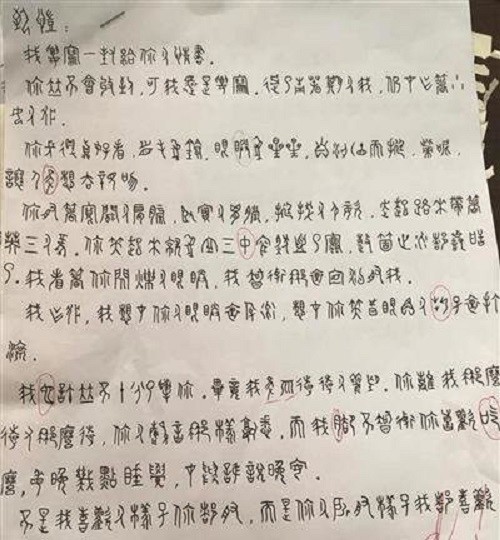In this age when expressions of romantic feelings--or any kind of feeling, for that matter--can be done in a matter of seconds online, composing a handwritten love letter may seem to be so old-school, not to mention, laborious. And adding ancient Chinese characters to a love letter? That may prove to be, well, cool.
An elective course in Wuhan University in Hubei Province introduces students to ancient Chinese characters, and they use them when writing love letters.
Course subject instructor Xiao Shengzhong guides the college students who opted to enroll in his class at the university’s School of Chinese Language and Literature in learning and using the ancient characters, reported Women of China.
Xiao, who previously worked as a museum staff, has been teaching ancient Chinese characters for 10 years now. He said that bronze objects and bones and shells of tortoises reveal ancient Chinese characters inscribed on them.
The enthusiastic teacher said that 4,000 of such characters, 1,500 of which are familiar, were found in tortoise shells and bones. Among bronze objects, 4,500 were found, 2,500 of which are familiar.
Anecdotes flow generously during classtime. Without stories supporting explanations, Xiao said that students will not get interested because the lessons “would be dry and boring.”
Xiao even shared a personal experience to make the students become more absorbed with their learning of the ancient Chinese characters. He told them about the time he used such characters when he composed a poem for a girlfriend before.
Students write letters to test how much have they learned. They devote a week, which could extend up to a month, making letters for a romantic partner or love interest or to anyone.
There are students who would even include a poem in the letter.
Some students gave love letters to Wang Kai (“Nirvana in Fire,” “Love Me, If You Dare”), to the delight of the 33-year-old TV actor.
Those letters that got posted online gained appreciation from netizens.
This might be another case of an enduring admiration for something ancient in these modern times--which is good.
As Professor Du Qinggang, the dean of the university’s School of Foreign Languages and Literature, said during an interview published at the school’s official website on Oct. 21: “Chinese characters are the backbones of our cultural identity.”



























